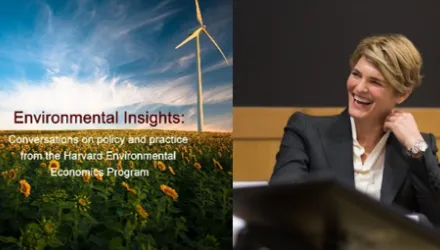The full discussion paper is available for download here: http://belfercenter.ksg.harvard.edu/publication/19880/
OVERVIEW
Keohane and Victor use the term 'regime complex' to describe the loosely coupled set of regulatory regimes that currently governs international efforts to address climate change. There are functional, strategic, and organizational reasons why a single, unified approach to reducing global greenhouse-gas emissions has failed to emerge thus far and is likely to remain out of reach for the foreseeable future. In this context, a regime complex may be preferable to the next realistic alternative and may even offer advantages in terms of flexibility and adaptability. To be effective, however, a regime complex needs to meet certain functional criteria, which are not being satisfied by the array of climate-change arrangements and institutions that exists today.
DISCUSSION
For two decades, governments have struggled to craft a comprehensive regulatory system for managing climate change. Instead their efforts have produced a complex of more or less closely connected regulatory regimes that includes institutions and clubs (such as the World Bank and G20), legal regimes and agreements (such as the United Nations Framework Convention on Climate Change — UNFCCC), expert assessments (such as those developed by the Intergovernmental Panel on Climate Change), and various bilateral and unilateral initiatives, to name just some examples.
Multiple factors account for this outcome, in which international efforts are neither fully integrated nor completely fragmented. From a functional standpoint, the specific regulatory challenges involved are so varied that a single institutional response is exceptionally difficult to organize. From a strategic standpoint, the benefits of a comprehensive regime may not seem sufficient to justify the bargaining efforts and concessions that would be required of individual states with often divergent interests. On the other hand, an entirely fragmented response is unlikely to satisfy the interests of leading states that expect first-mover advantages and make the largest investments in building institutions. These states will seek linkages among issues. A third set of factors involves path-dependence and organizational practices. Having decided to engage the climate issue at different times and in different ways, individual actors are likely to resist later changes to institutions and arrangements that they are already invested in.
Given these realities, policymakers may do better to focus on building an effective regime complex for climate change rather than pursuing a unified approach in the face of daunting political difficulties. The last sections of the paper discuss the importance of criteria such as coherence, effectiveness, sustainability, and accountability and suggest avenues for improving the current climate-change regime complex along these dimensions.
KEY FINDINGS & RECOMMENDATIONS
- Managing climate change is a politically difficult problem and the incentives for governments to organize around a common set of rules are weak. In this context, efforts to create an integrated, comprehensive regime are unlikely to be successful and may divert attention from more promising opportunities to build an effective regime complex.
- Regime complexes can have important advantages in terms of flexibility and adaptability, but these advantages are not automatic. Dispersed institutions can produce chaos, a proliferation of veto points and a tendency toward gridlock that deters investment in solutions to the climate-change problem.
- Six criteria can be used to evaluate the effectiveness of a regime or regime complex:
1)Coherence,in the sense that components of the regime complex are compatible and mutually reinforcing.
2)Accountability, in the sense that actors can be held to a set of standards and sanctioned if they fail to meet those standards.
3)Effectiveness, in the sense that the regime complex produces appropriate rules and a reasonable level of compliance with those rules.
4)Determinacy, in the sense that the rules of the regime have readily ascertainable normative content and foster the certainty needed to support costly, long-term investments.
5)Sustainability, in the sense that each element of the regime complex represents a coherent equilibrium such that large shocks would be required to destroy or fundamentally alter the overall arrangement.
6)Epistemic quality, in the sense that (a) the rules of the regime complex are consistent with scientific knowledge; (b) regime managers are accountable to those rules; and (c) both the rules and the terms of accountability can be changed if necessary.
- The existing regime complex for climate change ranks low on all these criteria. It could be improved by expanding international emission trading among states willing to do so, through a linked set of national and regional trading systems in which offsets would play a positive role, generating flows of resources to developing countries willing to take effective action. Border tax adjustments could play a positive role in conjunction with a non-universal trading system. Such a regime complex could also exploit opportunities for innovation around land-use and forestry offsets and strengthen and coordinate efforts to accelerate technology development.
CONCLUSION
With care, policymakers who seek more effective mechanisms to limit global greenhouse-gas emissions can deploy regime complexes to their advantage, using the six criteria described above to guide their investment in particular initiatives. The UNFCCC can continue to play an umbrella role and perform essential functions, such as providing a legal framework, developing information, and creating a forum for negotiations. If the policy preferences of key actors converge over time, the UNFCCC could yet evolve into an integrated and comprehensive regulatory regime. At the present juncture, however, political reality and the need for flexibility and diversity both argue in favor of working toward a loosely linked but effective regime complex for climate change.
Keohane, Robert O. and David G. Victor. “The Regime Complex for Climate Change—Summary.” Harvard Project on Climate Agreements, Belfer Center, January 2010



